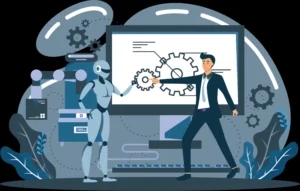What is Artificial Intelligence (AI)?
Artificial Intelligence (AI) refers to the simulation of human intelligence in machines that are capable of performing tasks such as learning, reasoning, problem-solving, and decision-making without human intervention. It encompasses various technologies including Machine Learning (ML), which enables systems to learn from data and improve over time; Natural Language Processing (NLP), which allows machines to understand and process human language, like chatbots; Computer Vision, which helps machines interpret and analyze images and videos; and Robotics & Automation, where AI powers machines to carry out complex tasks across industries such as manufacturing.
How Do Businesses Use Artificial Intelligence?
Businesses leverage AI for various applications, including:
- ✔
Customer Service Automation: AI chatbots provide 24/7 assistance. - ✔
Predictive Analytics: AI forecasts trends and customer behavior. - ✔
Fraud Detection: AI identifies suspicious financial transactions. - ✔
Process Automation: AI streamlines operations, reducing costs. - ✔
Personalized Marketing: AI tailors ads and recommendations based on user data.
Now, let’s dive into how AI is transforming different industries.
AI Use Cases in Major Industries
AI is widely adopted across industries to enhance productivity, accuracy, and innovation.
AI in Healthcare
It is transforming how medical professionals diagnose, treat, and manage patient care. From detecting diseases early to personalizing treatment plans, AI is playing a vital role in making healthcare more proactive and precise.
For example, if you’ve ever uploaded a chest X-ray to a health app and received an instant preliminary diagnosis like the possibility of pneumonia that’s AI working in real-time. One notable breakthrough is Google’s DeepMind, which has been able to detect breast cancer in mammograms more accurately than experienced radiologists.
AI has been shown to reduce hospital readmission rates by up to 50%, and the global market for AI in healthcare is projected to reach $187.95 billion by 2030, reflecting just how essential AI has become in saving time, costs, and lives.
AI in Banking and Financial Services
AI is revolutionizing the banking and financial services sector by enhancing fraud detection, assessing creditworthiness, and automating customer service through intelligent chatbots. It enables algorithmic trading to improve investment strategies and leverages predictive analytics for more effective risk management. AI also supports personalized banking by offering tailored financial advice based on customer behavior and data.
Real-world examples include JPMorgan Chase’s AI-powered COIN platform, which processes legal documents in seconds, saving over 360,000 hours of manual work annually, and Bank of America’s AI chatbot, Erica, which has managed over 1 billion customer interactions, significantly reducing human support costs.
According to PwC, AI-driven fraud detection has reduced financial fraud by 40%, and the AI in the banking market is projected to grow to $64 billion by 2030 (Statista).
Smarter Industries Start with Custom AI
We design solutions that solve challenges, enhance efficiency, and scale your success.
AI in Retail & E-Commerce
Retail and e-commerce companies use Artificial Intelligence (AI) to enhance customer experiences, improve inventory management, detect fraud, and optimize pricing strategies. AI technologies such as personalized recommendation engines, chatbot-based customer service, and real-time analytics play a crucial role in driving sales and boosting customer engagement.
For example, Amazon’s AI-powered recommendation engine contributes to 35% of its total sales by suggesting products based on user behavior, while Sephora uses an AI-powered chatbot to help customers find suitable beauty products, resulting in a 20% increase in online sales. Additionally, AI-driven insights help retailers better understand consumer behavior, optimize supply chain operations, and deliver predictive content suggestions, as seen on platforms like Amazon and Netflix.
AI in Education and Training
AI is transforming education and training by personalizing learning experiences, analyzing student performance, and adapting teaching methods to individual needs. Automated grading systems help reduce teachers’ workloads, while AI-driven virtual tutors offer personalized support to students. Smart classrooms leverage AI-powered tools to make learning more interactive and engaging.
For instance, Duolingo’s AI-based language learning platform customizes lessons based on user performance, boosting retention rates by 20%, while Carnegie Learning’s AI-driven math tutor improved student scores by 92% compared to traditional methods.
According to the World Economic Forum, AI-powered e-learning platforms have enhanced learning outcomes by 30%, and the AI in education market is projected to reach $20 billion by 2027 (Markets and Markets).
AI in Logistics and Transportation
The logistics and transportation sector is rapidly transforming with the integration of Artificial Intelligence (AI), which enhances efficiency, reduces costs, and streamlines operations. AI-powered systems analyze real-time traffic data to optimize delivery routes, ensuring faster and more cost-effective transportation. Predictive maintenance tools help identify potential equipment failures before they occur, minimizing downtime and repair costs.
Autonomous vehicles, including self-driving trucks and drones, are revolutionizing last-mile delivery by improving speed and reducing operational expenses. Companies like FedEx use AI to optimize logistics and reduce fuel consumption, while UPS leverages predictive analytics to improve vehicle maintenance.
With AI in logistics and transportation projected to reach $10.3 billion by 2030 (Allied Market Research), and AI-driven route optimization cutting delivery times by up to 30% (McKinsey & Company), the industry is poised for significant growth and innovation.
AI in Manufacturing
Artificial Intelligence is playing a vital role in transforming the manufacturing sector through robotic automation, predictive maintenance, and enhanced quality control. AI-powered systems streamline production processes, improve operational efficiency, and reduce downtime by identifying issues before they cause equipment failure.
For instance, General Electric (GE) uses AI for predictive maintenance, cutting machine downtime by 20%, while BMW employs an AI-driven quality control system that detects defects with 99% accuracy, significantly reducing production waste.
With AI in manufacturing projected to reach $16.7 billion by 2026 (Statista) and automation boosting production efficiency by 30–40% (Deloitte), the industry is rapidly embracing AI-driven innovation.
AI in Hospitality
In the hospitality industry, AI enhances guest experiences, automates routine operations, and optimizes revenue management. AI-powered chatbots efficiently handle bookings and inquiries, while smart hotel systems personalize services for guests.
Hilton’s AI-powered robot concierge, Connie, provides customized recommendations, improving customer satisfaction. Marriott uses AI to dynamically adjust room pricing, resulting in a 15% increase in revenue.
As AI in hospitality is expected to grow to $8 billion by 2026 (Hospitality Net) and AI-powered chatbots reduce booking costs by 30% (Travel & Hospitality Tech), the sector is leveraging AI to deliver smarter and more cost-effective services.
AI in the Automotive Industry
The automotive industry is undergoing a major transformation with the integration of AI technologies such as autonomous driving, intelligent navigation, and predictive vehicle maintenance.
Companies like Tesla use AI in their Autopilot system to reduce accidents by 40%, enhancing road safety. Waymo’s self-driving cars, which have logged over 20 million miles autonomously, showcase how AI can improve urban transportation.
With the AI automotive market projected to reach $74.5 billion by 2030 (Allied Market Research) and predictive maintenance reducing vehicle downtime by 25% (McKinsey), AI is set to redefine how vehicles are built, maintained, and driven.
Final Thoughts: AI is Shaping the Future of Every Industry
Artificial Intelligence is no longer just a buzzword it’s a powerful force driving transformation across every major industry. By enhancing efficiency, reducing operational costs, and fueling innovation, AI is helping businesses deliver smarter services and create better customer experiences.
Whether it’s revolutionizing patient care in healthcare, personalizing shopping experiences in retail, or automating operations in manufacturing and logistics, AI is at the heart of digital evolution. As the digital economy continues to expand, companies that embrace AI-driven solutions will stand out with improved agility, deeper insights, and sustainable growth.
At Equitysoft Technologies, we specialize in custom AI development solutions tailored to your business needs. From predictive analytics and smart automation to AI-powered apps and data-driven decision systems we help you unlock the full potential of artificial intelligence and stay ahead in a competitive market.







